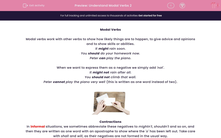Modal Verbs
Modal verbs work with other verbs to show how likely things are to happen, to give advice and opinions and to show skills or abilities.
It might rain soon.
You should do your homework now.
Peter can play the piano.
When we want to express them as a negative we simply add 'not'.
It might not rain after all.
You should not climb that wall.
Peter cannot play the piano very well (this is written as one word instead of two).

Contractions
In informal situations, we sometimes abbreviate these negatives to mightn't, shouldn't and so on, and then they are written as one word with an apostrophe to show where the 'o' has been left out. Take care with shall and will, as their negatives are not formed in the usual way.
can / can't
could / couldn't
will / won't
would / wouldn't
shall / shan't
should / shouldn't
might / mightn't
must / mustn't
ought to / oughtn't to
May not is not usually abbreviated to mayn't because it would sound very old-fashioned!
Modal verbs do not act like ordinary verbs when we put them in the past tense. 'Can' becomes 'could'.
Katie can play the piano.
Katie could play the piano.
However, in most cases, the modal verb stays the same but the main verb uses 'have' and then the past participle.
I should go to bed at nine o'clock.
I should have gone to bed at nine o'clock. (Or: I should've gone to bed at nine o'clock.)
Andrew might come round this evening.
Andrew might have come round this evening. (Or: Andrew might've come round this evening.)
It is a very common mistake to write 'should of' and 'might of' instead of 'should have' and 'might have', but this is never correct.
In this activity, you will attempt putting modal verbs into their negative form and past tense.
.jpg)








